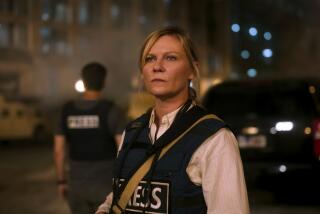Movie review: ‘War Horse’ is the purest sort of love story
“War Horse,” Steven Spielberg’s epic family drama about the enduring connection between a boy and his horse and the Great War that tears them apart, has the sweep of a classic John Ford movie, the sentiment of Frank Capra and a spirited steed named Joey who will steal your heart. The film itself, which opens Sunday, is more difficult to love.
The emotional signature of the director can be felt from the first frames as he establishes the relationship and the mood of the piece — there will be tears. The setting is rural England on the eve of the First World War, the moors and all their harsh beauty made gorgeous by cinematographer Janusz Kaminski, a longtime Spielberg collaborator, who uses the same painterly touch whether the scene is pastoral or decimated by war.
A colt is being born in the field and a teenager, who turns out to be Albert Narracott (Jeremy Irvine in his feature film debut), crouches in the distance, awed by the sight. His father (Peter Mullan) is a forgotten war hero whose memories have turned him into a drunk. Salt-of-the-earth mum, Rosie (Emily Watson), as solid as the ground she stands on, has been worn down by the trials of the land and her husband’s soggy state.
Time passes — slowly. The horse grows up with Albert still looking on at a distance, until his dad, sent to buy a plow horse, comes back with a pub buzz, empty pockets and the untrained 2-year-old. Never one to underplay his hand, Spielberg leaves little doubt that Albert’s and Joey’s fates are sealed. War, battles, other riders and other challenges will come and go, but nothing short of death can break their bond.
Essentially screenwriters Lee Hall (“Billy Elliot”) and Richard Curtis (“Love Actually” and the “Bridget Jones” films) have given us the purest sort of love story. In structure, it follows the three-act basics of most romantic comedies or dramas — they meet, they are separated, they struggle to find their way back to each other. In tone, “War Horse” is a symphony in minor key (with composer John Williams playing those chords with a very heavy hand) to the unconditional and unwavering love that animals extend us, long a film staple, with the distinctive relationship with horses in particular yielding a rich vein that includes “National Velvet,” “The Black Stallion,” “The Horse Whisperer,” “Seabiscuit” and countless others.
Adapted from the 1982 children’s novel by Michael Morpurgo, “War Horse” was a sensation on stage from its London premiere in 2009 to its New York opening earlier this year, with the horses brought to stunning life as giant puppets. Without those visual theatrics, the screenwriters shift more focus on the people that surround Joey, their worries and woes trying hard to stack up to the noble steed’s. In that, the filmmakers have sometimes succeeded and sometimes stumbled, with the earlier scenes beautiful but flat and too many subplots, ranging from landlords to flirtations, that don’t pay off. Even Irvine, who as Albert is both Joey’s soul mate and his destiny, isn’t given the sort of gravitas needed to seriously break your heart.
Things pick up considerably when the colt is sold to the military, and with that comes a new string of characters and a series of action set pieces that are as exhilarating as they are devastating. War — battle-hot or postwar cold, reality or fantasy — has always brought out the best in Spielberg, and so it is with “War Horse.” A cavalry charge filled with the sound and fury of a hundred soldiers, their swords flashing, their horses racing breakneck across a field, is unbridled passion at top speed. Even the muddy trenches of France, its battlefields coiled by barbed wire, men hollowed out by the fighting, is brought to life with Spielbergian grace.
Joey’s war years begin with a gentleman soldier, Capt. Nicholls (sensitively drawn by Tom Hiddleston), who has promised to care for Albert’s horse and spends time between skirmishes making sketches to send back to the boy. In France there is a succession of owners, endless forced marches, huge German howitzers to haul and other hardships. Whatever happens to the humans in this war-torn, devastated landscape, it is the animals whose pain we feel most keenly.
Which is to say, Joey owns nearly every good scene in this movie, whether he is being hidden by a charming French farm girl (Celine Buckens) and her grandfather (Niels Arestrup) or in the care of German soldiers, everyone ups their game in his presence (with 14 horses used to create that life at various stages). The incredible emotive power of this horse and the way in which the filmmakers were able to translate it on-screen are what stay with you.
There is great beauty in “War Horse,” great power in the emotional journey for both boy and beast, if only Spielberg had trusted that we would be able to read between the lines.
More to Read
The biggest entertainment stories
Get our big stories about Hollywood, film, television, music, arts, culture and more right in your inbox as soon as they publish.
You may occasionally receive promotional content from the Los Angeles Times.







